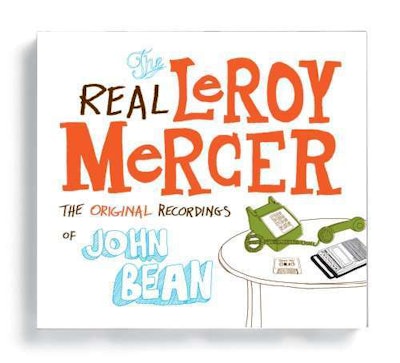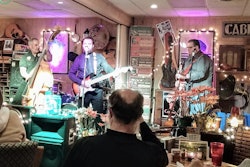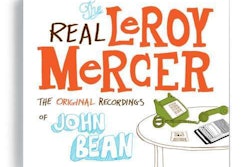From 1987 to 1993, Knoxville musician Todd Steed worked at the now-defunct Raven Records store on Cumberland Avenue, “the main strip near the University of Tennessee” in Knoxville, Steed says. While he was there, a friend and fellow musican, Mark Palmer of Powell, Tenn., dropped a fuzzy cassette tape of some prank calls on him that, though he didn’t know it immediately, would be one of the most influential forces in prank-call comedy of the next generation.
Steed knew nothing about the origins of what he had, but the infectious nature of the comedy involved naturally led to him making copies of the tape for friends and customers at Raven Records to the point where, he says, “we were making hundreds of tapes. People brought in blanks. I was working one day, and this giant semi pulled into our parking lot. I said, ‘What’s this guy want?'” The trucker came in, Steed says, blank tape in hand, and said, “You got the LeRoy Mercer tapes?” He was an Oklahoma native who’d heard about the tape third- or fourth-hand.
 The CD and digital downloads are available via Amazon and other retailers.
The CD and digital downloads are available via Amazon and other retailers.Remastered versions of the calls on that tape, now out on CD from Nashville’s Dualtone Records as The Real LeRoy Mercer: The Original Recordings of John Bean, were the work of a man who, on Aug. 18, 1984, at age 33 went into respiratory failure as the result of resurgent cancer. That cancer was the outcome of over-radiation when Bean was treated a decade or more earlier for Hodgkin’s Disease, says his surviving sister Betty. An inveterate prankster, as the tape and new CD make clear, when Bean passed away, Betty says, a friend was on the way to the hospital with a video camera, “and they were going to mess with the nurses.”

That Oklahoma trucker wasn’t the last to stop in at Raven when it served as the hot spot for what would become an international underground phenomenon, Steed says. Nor would that tape be the last installment of the craze Bean unwittingly created. A veritable industry of imitators has arisen in subsequent years, including the calls of the character Roy D. Mercer, created by Brent Douglas and Phil Stone at KMOD in Tulsa, Okla., in the 1990s with several subsequent CD releases, though Douglas and Stone both claim no prior knowledge of the tapes. Perhaps a more direct imitation came out of the Bristol, Tenn., area just north of the Beans’ Knoxville home base via a character you might recognize from his many — admittedly staged-sounding — prank calls to NASCAR drivers. He calls himself Lee Roy Mercer. It’s an alternate spelling of Bean’s most famous telephonic pseudonym.
Bean used that name on a call that is part of the first three on the CD, the classic trinity of “whupass calls,” as Betty tells it. In it, Bean, identifying himself as LeRoy Mercer, rings up a well-meaning manager at the Thom McCann shoe store in Knoxville (long since closed) seeking well-deserved restitution for a bum pair of boots he says “got a little bit damp and folded up, looks like a damn dog’s been eatin’ on ’em.” Through the course of the call — at the end of which “Mercer” and the manager, after a series of intentional miscommunications and hilarious misdirections on Bean’s part, realize that the caller probably bought his boots at a neighboring store — Bean delivered what is today the one of Lee Roy and Roy D.’s signature lines, modified for all manner of advertisements, among other uses: “It ain’t nothin’ for me to whoop a man’s ass.”
“How is it that two redneck pranksters living over 900 miles apart could be so similar,” asked Coury Turczyn in her Knoxville Metro Pulse story on the subject in June 2008, “using the same words, the same gags, the same identities? Are they twin brothers, or could it be a remarkable case of divine comedic coincidence?”
Bean’s been dead 24 years, but clearly his legacy lives.
“We heard the tapes — just like everybody else — when we got a cassette from friends,” says Dave Lang of Atomic Films, a commercial and industrial DVD-length film producer based in Chattanooga, Tenn. “We heard it was a guy who was in jail, and the tapes were made from his cell where, somehow, he had a phone. There were stories that he was in an insane asylum.” Lang and his business partner, Bobby Stone, in the mid-1990s got curious about the reality of those origins and set about finding them. They looked up Knoxville’s Eddie’s Auto Parts, the receiver of the first call on the tape and CD, in which Bean wrangles with shop owner Eddie Harvey about an oil filter Bean claims “blowed up” his engine.
Eddie, it turned out, had become something of a minor celebrity in Knoxville due to the burgeoning notoriety of Bean’s calls. “[Eddie] got folks dropping by all the time,” Lang says, “and he pointed me in the right direction. He told me to call Betty.”
Betty too was no stranger to calls from California to Rhode Island and areas in between wondering about John, she says. “Mostly it was people looking to make a buck. Bobby and Dave were just kind of different — they were very sincere.”
Lang and Stone proposed that they do a documentary on John and the phenomenon of the tape, but in the end, pressed for time in their business, in 1999 decided with Betty to release the tape on CD. “The legs that this thing has is amazing,” Lang says. “We found people as far away as England who were buying the CD” and who remembered the original tapes.
When Dualtone took over the project last year, Atomic assembled the best of the source material they’d filmed for a promo video you can find on YouTube — search “Legacy of John Bean.” The short includes segments of an interview with family and friends and, among others, comedian Jeff Foxworthy, who claims Bean’s tape was a big influence on him. Foxworthy was working at a comedy club in Atlanta a particular night, and his brother brought him the tape. “I knew that night my life had been changed,” he told Lang and Stone.
As is common among Bean’s fans, Foxworthy told Lang and Stone that, to this day, he and his brother don’t get through a conversation without one of them interrupting the other with a peremptory “hunh,” no question mark, a signature of most of Bean’s comic personas. A similar dynamic pervades the Chattanooga offices of Atomic Films. “Not a day goes by that you don’t hear somebody screaming across the office” one of Bean’s choice lines, Lang says.
As for Steed, it turned out that, as he was making copies of the to-him-unknown caller’s tapes during his tenure at Raven Records, he could easily have cased the caller’s identity with just a few well-placed questions. He knew Betty, for instance, as well as “several other people that, had I known, I could have just asked.”
Paul Roper, Dualtone Records’ general manager, says that what’s happened since the explosion of the tapes’ popularity and their relative anonymity outside of Knoxville is that “people have taken advantage of the anonymity of the situation. There’s a lot of confusion that goes on right now” about who is actually whom among the various Bean imitators.
“One day there might be some legal action,” says Betty. “It’s almost like [the imitators are] trying to deny John’s existence. It would make an interesting copyright case.” But she too acknowledges the situation for what it is: the often contradictory myths that were perpetuated throughout the nation and the world about the early-1980s prankster’s true identity have enabled the imitators to flourish today. And while Betty doesn’t sound in any way regretful about her brother’s confused notoriety, she hopes along with Roper and the Dualtone crew that the new CD will finally put to rest any doubt among listeners about who he was.
The imitators, Betty suggests, are an unfortunate aberration of her brother’s gift for harmlessly manipulating human nature to comic effect. “John was certainly vulgar from time to time,” she says. “I suppose you could even say that sometimes he was mean. But he didn’t go after [his subjects’] families and try to hurt people in fundamental ways.”
The character that emerges from his calls is indeed as multidimensional as the many fictions told about him through the years — audacious, larger than life and ultimately hilarious. “He was just fun,” Betty says. “I really do believe that something big would have happened for John had he lived. He was a good-looking guy. He had a really positive attitude. He was real smart. If half the time he had you wanting to kill him, life’s just not quite as Technicolor as it was when he was here.”
Eddie’s Auto Parts
As John Bean’s sister Betty tells it, Bean had “a sly kind of humor that would sneak up on you.” When he was on one of his prank calls, he often had a stopwatch running just to see how long it’d take him to make whoever he was talking to cuss, without necessarily cussing much himself. Eddie Harvey, owner of Eddie’s Auto Parts, the receiver of the first call on The Real LeRoy Mercer, was a favorite subject, Betty says. “He’s sold a lot of T-shirts because of John’s tapes. John did way more things to him than just that one tape. Eddie was one of those people John just loved to make cuss.”
Harvey was the subject of a bit in episode seven of Johnny Knoxville’s Jackass series, too, after Knoxville (P.J. Clapp) had featured Harvey in another story about the Bean tapes in the 1990s, says Betty.
As for Eddie, he’s 88 years young still at his shop on Walker Road in Knoxville just off the I-640 loop north of town — don’t look for any diesel oil filters there, though. “Eddie’s Auto Parts,” Harvey says, means what it says.









